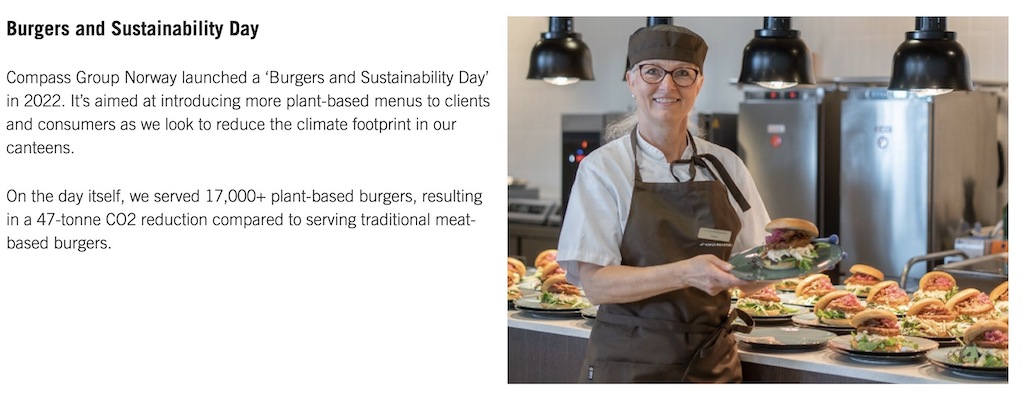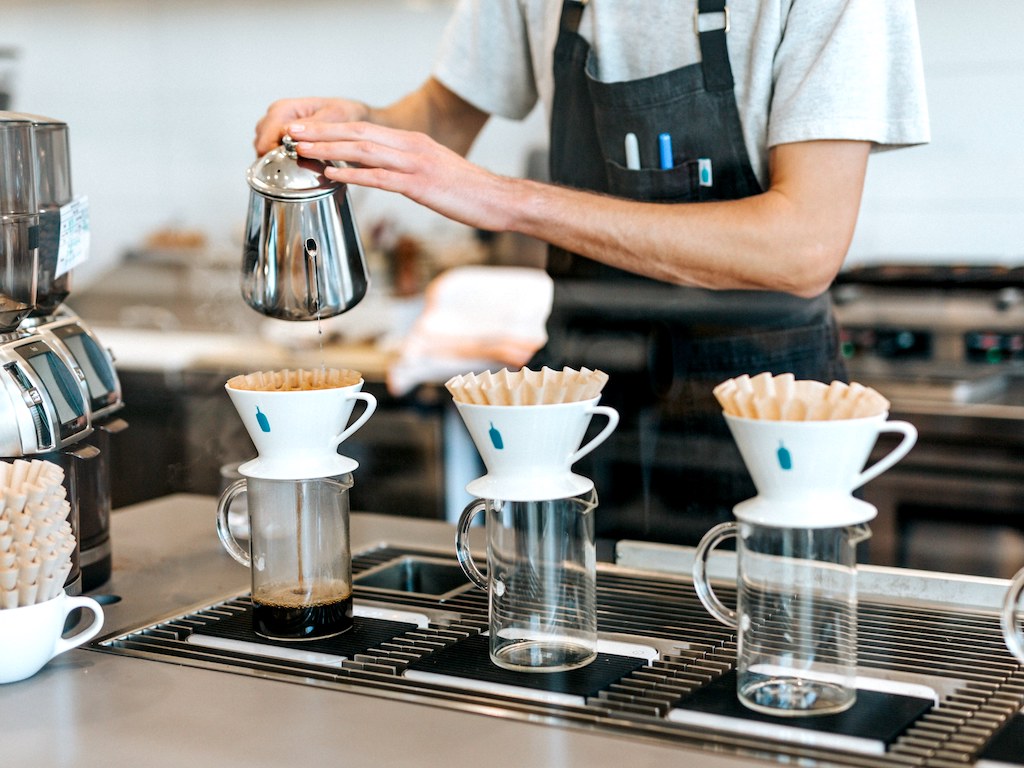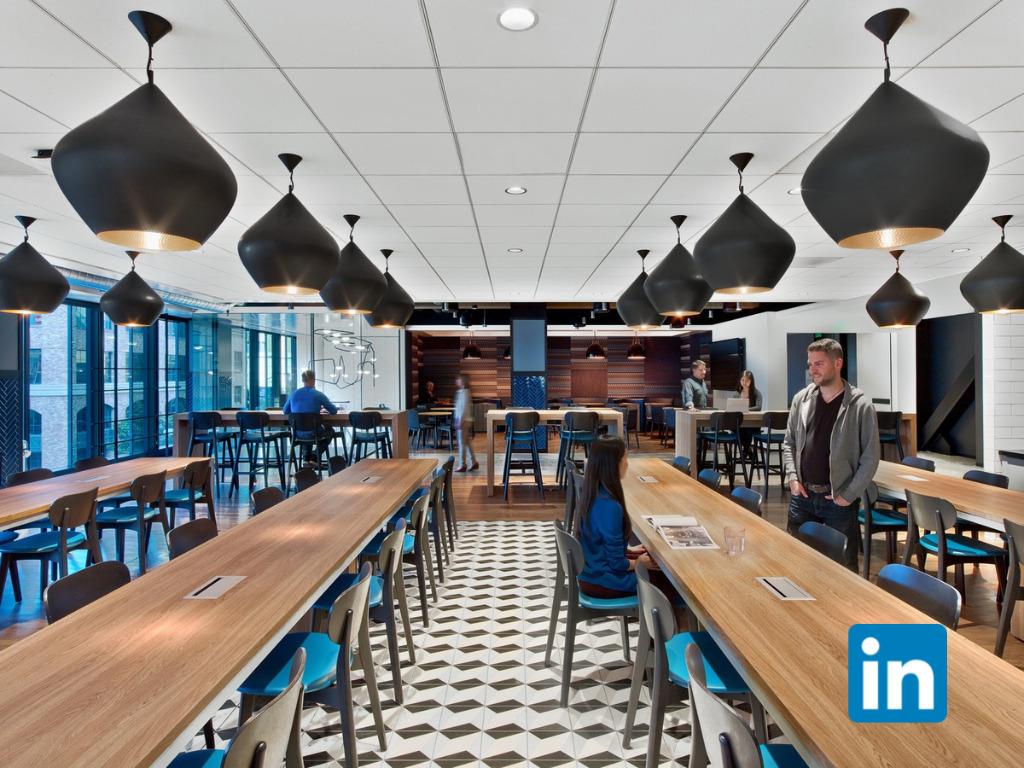6 Mins Read
Over in foodservice, behavioral architecture and future-thinking operators are ushering in an age of plant-forward corporate cafeterias, which is good news for both the planet and a new generation of climate-conscious talent.
While the debate over the future of the plant-based meat industry rages on, one area that is showing signs of hope in the fight to reframe what’s on our plate is foodservice. SPINS data, often quoted in hit pieces by underfunded journalists about the supposed demise of the sector covers retailer stats- think grocery stores and other shopping outlets where consumers can purchase food. And while in the US the numbers show flat or negative retail growth for plant-based meat replacement products (important note: Europe, Latam and Asia data does not support the same narrative) as consumers fight rising food inflation, the higher prices of most of these products compared to their conventionally-reared animal counterparts and a general ebb of the novelty of headline-grabbing brands like Impossible Foods, foodservice operators offer lessons in how to transition consumers to lower emissions, plant-forward diets.

Foodservice giants commit to plant-forward eating
Foodservice is a broad term that encompasses everything from school cafeterias to corporate canteens, as well as hospitals, travel meals (food service in airport lounges, on airplanes, in trains) and restaurants (including fast food chains).
Foodservice operators, a fairly consolidated industry that counts giants such as UK-headquartered Compass Group and French MNC Sodexo, are increasingly committing to a more plant-forward offering for the patrons they serve as they work to decarbonize their operations, particularly those pesky Scope 3 numbers aka emissions from agriculture, food processing, waste, and transport upstream, as well as transport, consumption, and waste downstream.
Back in 2021, Compass Group said it was planning to replace 40% of the animal-based foods throughout its supply chain with alternative proteins as part of its net-zero emissions campaign.
Earlier this year, Sodexo shared that ten percent of all meals sold across almost 500 outlets in their UK and Ireland business in 2022 were vegan or vegetarian, up from 8% in 2021. For healthcare clients, that figure was 17%.
Choice Architecture & The Power of Nudging
Eve Turow-Paul, founder of the non-profit Food for Climate League, which works with partners such as Sodexo’s Future Food Collective and the Better Food Foundation to democratize sustainable eating and empower consumers towards climate-smart eating using nudging and choice architecture says that you can shift the norm “by making plant-based or plant-forward the default offering, while still providing the option to consume animal products with a request”.
Dr Sophie Attwood, senior behavorial scientist at the World Resources Institute, has done extensive research on the levers that help change people’s dietary habits. She agrees that making the desired choice accessible and convenient is key. “Some of the stronger approaches are those that don’t directly rely on people making a thought-through change each time they select lunch (i.e. talking to them about the environment etc), but instead craft their choice context so this decision naturally flows.”
In a review of all the levers (her team has identified 81 in total) people use to make food choices, she says there is the most evidence for approaches that “modify the food offering and then incentivize the desired choice – i.e. Increase the variety of plant-rich dishes on offer, add more of them to the menu, and then sell them at a good price or offer reward/loyalty card points.

Linkedin’s ‘Extremely Succesful’ Pilot
Linkedin, the US-based business social media company that has over 21,000 employees globally, worked with Sodexo subsidiary Good Eating Company (GEC) and Greener By Default (GDB), an organization that uses behavioral choice architecture to help make plant-based food choices the default says it has halved the carbon emissions of its San Francisco office and saved 14,400 CO2 equivalent, for comparison that’s the emission of driving 35,000 miles.
The company launched a 12-week pilot that involved replacing the majority meat-based menu with a majority plant-based menu (a 2:1 ratio of dishes, or 65% plant-based), making oat milk the default coffee bar choice and featuring flavors rather than words like “vegan” and “vegetarian” on the menu dish title cards.
A company spokesperson told VegNews: “We’ve always incorporated plant-forward efforts into our program, but working with GBD allowed us to take it to the next level and make plant-based offerings front and center while still preserving freedom of choice.”
Interestingly, they did not face any employee pushback. According to a statement by a Sodexo spokesperson, “the pilot was extremely successful.” Not only was the amount of meat served and resulting carbon emissions halved, “diner satisfaction remained constant.”
GEC chef Alicia Jenish Mc Carron, who worked on the pilot, said in a video that “we’ve had not a [sic] negative word about the reduced meat option”. A Linkedin employee said that because of the options presented during the pilot, he ate “a lot more vegetables and a lot more plant-based food”.
Younger Employees Are ‘Eating Less Meat’
Offering environmentally-friendly foods may be key to retaining upcoming talent. Fedele Bauccio, co-founder of Bon Appétit Management Company, which provides food service at corporate cafeterias (including LinkedIn) told the New York Times that younger employees in particular are “demanding more culturally authentic meals and climate-friendly kitchen protocols” and “eating less meat”.
This tracks with what Turow-Paul has observed. “There are many ways to increase eater interest in plant-forward dishes, mainly because people seem to already be interested, it’s just that our usual environments aren’t conducive to plant-forward dining.”
Veganuary, a yearly UK-based global campaign aimed at getting people to try out a vegan diet for 31 days in the month of January says over 150 organizations have signed on to the non-profit’s Veganuary Workplace Challenge. This is a 50% increase compared to last year. 100+ organizations joined in 2022 and more than 60 in 2021, according to numbers shared with Green Queen.
This year, names such as Aveda, Loyola Marymount University, Behaviorally, and LinkGraph are participating. Companies are looking for ways to curb their corporate emissions and empower their employees to discover climate-conscious eating. “By collaborating and making a commitment to Veganuary, we are taking another step and doing our part to support a more sustainable future for all” added Janice Lai, VP Marketing at Behaviorally.

Restaurant Chains Are Getting Involved Too
In 2020, the furniture behemoth IKEA pledged that by 2025, 50% of the main dishes offered in its store restaurants would be plant-based and 80% would be red meat-free. Further, it promised that 80% of all of its packaged food would be plant-based. While most people associate IKEA with budget DIY assembly furniture, the Swedish giant told Fast Company in 2019 that it was the sixth-largest restaurant chain in the world. Buildd.co estimates the company serves over 230 million customers at its restaurant each year. That makes the company’s plant-based commitment incredibly powerful from an emissions reduction perspective.
Burger King’s UK franchise made a similar commitment in 2021, stating that 50% of its menu will be plant-based by 2031 at its 500+ locations across the country.
In May of last year, Blue Bottle Coffee chain announced it had made oat milk the default milk choice in their US location (approximately 100 stores) as part of the company’s commitment to achieving carbon neutrality by 2024 writing in a blog post that they estimated dairy to be a leading source of emissions in their cafe operations and “sought the opportunity to go plant-based and reframe what it means for a choice to be ‘alternative.’”
Early trials showed promising results in terms of consumer behavior: in Southern California, the company saw a 28 percent increase in oat milk-based beverage orders over six months in 2021 and a 40% increase in New York stores in early 2022 compared to the previous six months.




